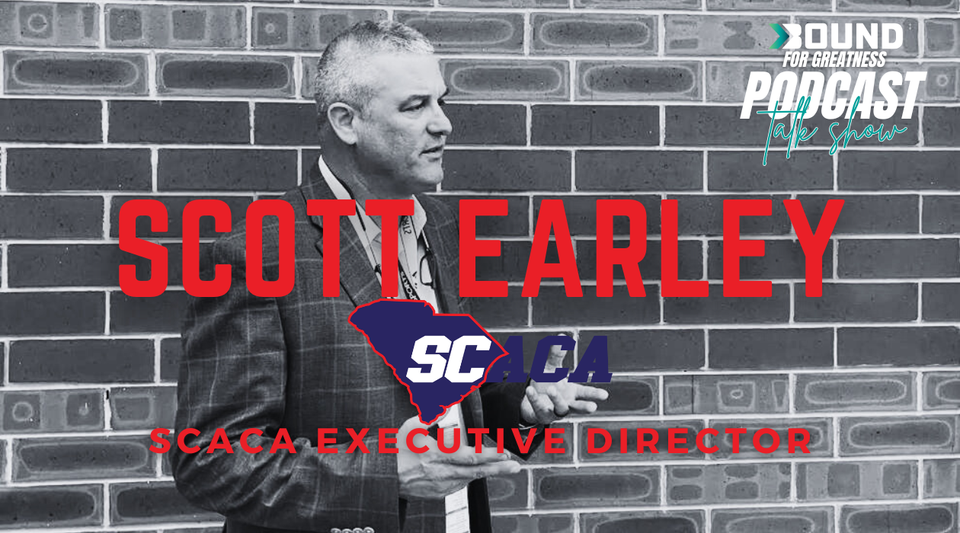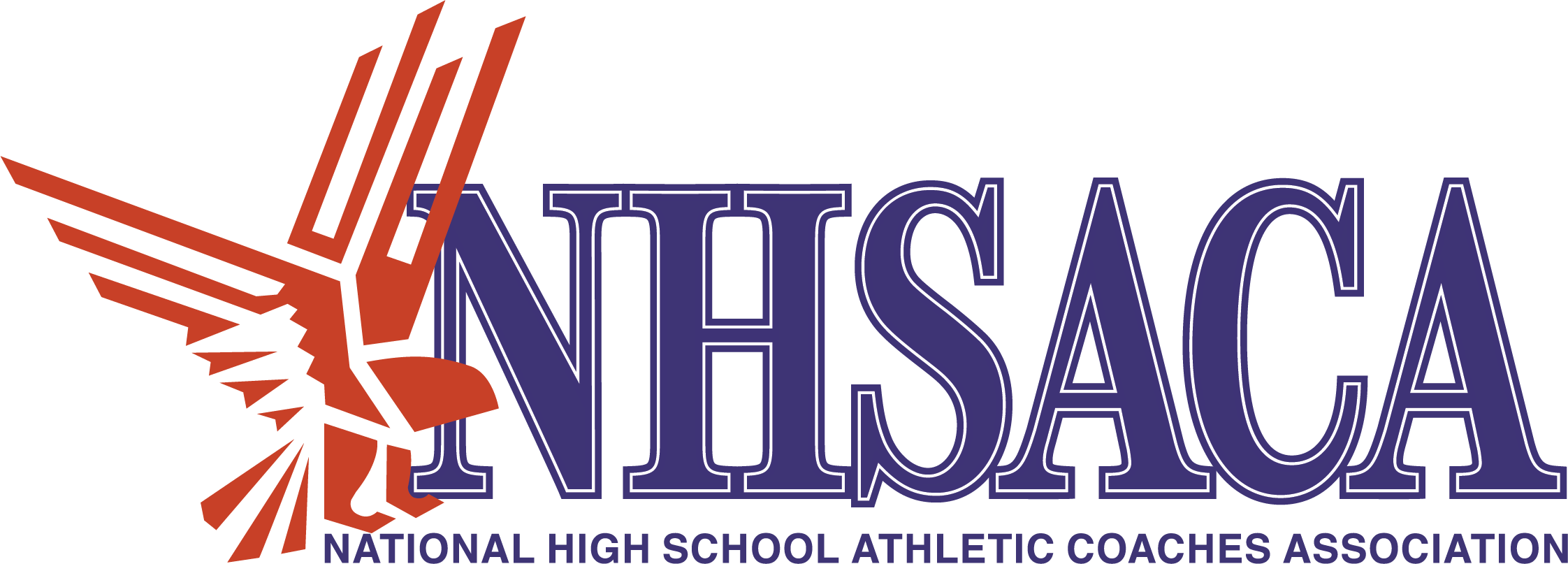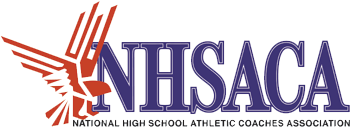Welcome South Carolina Leadership, Unity, & Purpose in Athletic Coaching

Scott Earley discusses the Reasons SCACA Joins the NHSACA
Scott Earley has proven himself a powerhouse in South Carolina’s high school athletics, with his career-long dedication shaping the landscape for coaches and athletes alike. Earley’s position as the executive director of the South Carolina Athletic Coaches Association (SCACA) has been marked by a dedication to advocacy, mentorship, and an unwavering commitment to elevating the role of sports in education. With a coaching record of 176-67 with 4 State Championships with 1 as a head Coach in Myrtle Beach in 2008 and 15 consecutive playoff appearances, Earley’s journey embodies both success and service. In a recent appearance on the Bound for Greatness podcast, hosted by Scott Garvis, Earley shared insights from his role and discussed the programs he’s championed to support coaches and address today’s most pressing issues in athletics.
Joining the NHSACA
A significant topic of their discussion revolves around the benefits of joining the National High School Athletic Coaches Association (NHSACA). Earley expresses enthusiasm about the opportunities for growth and development that come with membership. "Being part of the NHSACA opens doors for professional development, networking, and sharing best practices with other coaches and leaders nationwide," he explains. He encourages athletic directors and coaches in South Carolina to embrace this opportunity to enhance their skills and better serve their student-athletes.
Garvis adds that the NHSACA provides invaluable resources that can empower coaches to continually improve their programs. "We’re creating a culture where coaches feel supported and equipped to face the challenges in today’s athletic landscape," he states. By joining the NHSACA, coaches can access mentorship, educational resources, and a community dedicated to the collective success of high school athletics.

Shaping the Future of South Carolina’s Athletic Culture
Since becoming SCACA’s executive director, Earley has worked tirelessly to amplify the voices of coaches across the state. Acknowledging that the organization’s influence is deeply rooted—founded in 1948 and passed through only four leaders before him—Earley’s vision includes honoring this history while guiding SCACA’s evolution to meet modern needs. Earley emphasized the importance of maintaining and nurturing SCACA’s legacy: “Growing the legacy, but not changing too fast,” he explained, highlighting the delicate balance of respecting the organization’s history while pursuing meaningful change.
Two of Earley’s most impactful initiatives are “Coaches Versus Opioids” and the “Tomorrow 25” program. In South Carolina, where the opioid crisis has deeply affected communities, Earley recognized coaches as powerful influencers. “Coaches influence athletes, and athletes influence parents,” he said, acknowledging the unique position coaches hold in the lives of student-athletes. By educating coaches and equipping them with resources, Earley has helped SCACA leverage this influence to combat opioid misuse, an effort he believes is saving lives.
SCACA Scott Earley Implements Coaches vs. Overdoses Prevention Program
With “Tomorrow 25,” Earley has built a program designed to recognize and retain promising coaching talent, a critical need in today’s educational climate. According to Earley, “retention is the most difficult thing now.” He explains how the financial gap between coaching and other careers often drives young coaches away. By identifying “middle-of-the-road coaches” with the potential to become “rock stars,” SCACA hopes to foster long-term investment in the profession, creating pathways for young coaches to see the career as viable and rewarding.
Building Unity and Facilitating Success
A critical theme of Earley’s leadership philosophy is empowerment. He understands that the key to uniting SCACA’s 9,000-plus members across diverse regions is trust and empowerment. “Just empower, trust them, and facilitate for them,” he says, “because when people have buy-in and they have a purpose…those [individuals] are going to work hard and succeed.” This approach has created an organization that thrives on collective responsibility and shared vision.
Earley also recognizes the value of reflection and celebration of success—qualities often overlooked in the high-stakes, results-driven world of sports. “How many times as coaches do we just sit down, reflect on success, and celebrate it?” he asked, underscoring the importance of pausing to appreciate victories, big and small.
Championing Benefits and Support for Coaches
Under Earley’s direction, SCACA has implemented crucial benefits for its members. Coaches in South Carolina now have $2 million in insurance coverage, which protects them from potential lawsuits or wrongful accusations. A scholarship fund for members’ children, and ongoing efforts to create a “death benefit” for coaches who face unimaginable losses, underscore Earley’s commitment to supporting coaches both professionally and personally.
Earley’s ongoing work with legislators has strengthened SCACA’s influence, helping secure resources and support for coaches that were previously unavailable. His emphasis on building relationships across educational and legislative communities has helped the organization achieve what Earley describes as a “united front on doing what’s best for the student-athletes in our state.”
Recognizing Change-Makers
Earley and Garvis also discuss the importance of recognizing those who make a difference beyond mere statistics or accolades. "The real difference-makers aren’t looking for recognition—they just have a sense of pride and achievement," Earley emphasizes. Garvis adds that celebrating coaches who impact their teams is crucial, regardless of their win-loss records.
A Vision for the Future
Earley envisions a future where South Carolina is known nationally for its unity and commitment to diversity in athletics. "The goal is to create unity, have South Carolina known on a national stage as a group of people open to learning and diverse opinions," he states. This vision aligns with the broader mission of the NHSACA, of which both leaders are passionate advocates.
A Legacy of Leadership and Service
Scott Earley’s leadership style is both visionary and practical, addressing the changing dynamics of the coaching profession while honoring its traditions. He has leveraged his platform to initiate critical changes, from fostering young coaching talent to supporting coaches in times of need. And, while many in the field focus on the immediate rewards of success, Earley remains steadfast in his commitment to fostering a legacy. As he explains, it’s about more than just the paycheck—it’s about making a difference.
For Scott Earley, coaching is more than just a profession. It’s a lifelong calling—one dedicated to positively shaping South Carolina’s athletic community and creating an enduring impact on the lives of countless young athletes. Earley’s vision will undoubtedly influence SCACA and South Carolina athletics for generations to come.
the dialogue between Scott Earley and Scott Garvis illustrates the essential role of leadership in athletic coaching. Their shared commitment to service, unity, and continuous learning exemplifies the values that drive positive change in the lives of student-athletes and the broader athletic community. As they look forward, both leaders are dedicated to fostering an environment that promotes growth, collaboration, and recognition of the hard work put in by coaches and athletes alike. Joining the NHSACA stands as a vital step towards achieving these goals, ensuring that coaches are well-prepared to lead their teams to success.

Member discussion